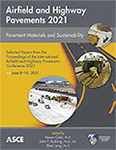The Use of the Indirect Tensile Test to Evaluate the Resistance of Asphalt Mixtures to Cracking and Moisture-Induced Damage
Publication: Airfield and Highway Pavements 2021
ABSTRACT
The Virginia Department of Transportation (VDOT) is currently taking steps toward incorporating performance-based criteria into asphalt mixture design in an effort to build more durable and longer-lasting pavements. As part of this effort, the indirect tensile (IDT) conducted as per ASTM D8225-19 has been selected as a test method for evaluating the cracking susceptibility of asphalt mixtures. VDOT also requires that the susceptibility of asphalt mixtures against moisture-induced damage be evaluated by means of the AASHTO T283 standard. Apart from the difference in data analysis methodology, specimen thickness is the major difference between the two tests. For a 150-mm-diameter specimen, the IDT cracking test procedure specifies a specimen thickness of 62 mm, while the AASHTO T283 procedure requires a 95-mm thickness. The objective of this study was to investigate if the test procedure in AASHTO T283 can be modified by reducing the specimen thickness such that only one test can be performed for assessing the resistance of asphalt mixtures to moisture and crack-related damage at the same time. In addition, the cracking tolerance (CT) index was evaluated to quantify the cracking and moisture susceptibility of asphalt mixtures. The test results from five plant-produced asphalt mixtures indicated that the moisture damage test as per AASHTO T283 can be performed on asphalt concrete specimens with a thickness of 62 mm and a diameter of 150 mm. The analysis also indicated that the CT index was unable to provide the expected performance trends for asphalt mixtures subjected to a freeze-thaw cycle.
Get full access to this article
View all available purchase options and get full access to this chapter.
REFERENCES
Anderson, R. M., Christensen, D. W., and Bonaquist, R. (2003). Estimating the rutting potential of asphalt mixtures using Superpave gyratory compaction properties and indirect tensile strength. Journal of the Assoc. of Asphalt Paving Tech., 72.
Bowers, B. F., Diefenderfer, B. K., Wollenhaupt, G., Stanton, B., and Boz, I. (2019). Laboratory Properties of a Rejuvenated Cold Recycled Mixture Produced in a Conventional Asphalt Plant. In Airfield and Highway Pavements 2019: Testing and Characterization of Pavement Materials (pp. 100-108).
Boz, I., and Solaimanian, M. (2014). Design of cement stabilized full depth reclaimed mixes using Superpave Gyratory Compactor. In Asphalt Pavements (pp. 685-694). CRC Press.
Christensen, D. W., and Bonaquist, R. F. (2004). Evaluation of indirect tensile test (IDT) procedures for low-temperature performance of hot mix asphalt. Transportation Research Board.
Dave, E. V., Daniel, J. S., Mallick, R. B., DeCarlo, C., Veeraragavan, R. K., and Kottayi, N. M. (2018). Moisture Susceptibility Testing for Hot Mix Asphalt Pavements in New England, Burlington, VT: New England Transportation Consortium.
Diefenderfer, B. K., Boz, I., and Bowers, B. F. (2019). Evaluating cracking tests for performance-based design concept for cold recycled mixtures. In Airfield and Highway Pavements 2019: (pp. 220-229).
Diefenderfer, S. D., and Bowers, B. F. (2019). Initial approach to performance (balanced) mix design: The Virginia experience. Transportation Research Record, 2673(2), 335-345.
Diefenderfer, S. D., Boz, I., and Habbouche, J. (2021). Balanced Mix Design for Surface Asphalt Mixes: Phase I, Initial Roadmap Development and Specification Verification. Virginia Transportation Research Council Report.
Im, S., and Zhou, F. (2017). New and simpler cracking test method for asphalt mix designs. Transportation Research Record, 2631(1), 1-10.
Seitllari, A., Boz, I., Habbouche, J., and Diefenderfer, S. D. (2020). Assessment of cracking performance indices of asphalt mixtures at intermediate temperatures. International Journal of Pavement Engineering, 1-10.
Solaimanian, M., Bonaquist, R. F., and Tandon, V. (2007). Improved conditioning and testing procedures for HMA moisture susceptibility (Vol. 589). Transportation Research Board.
Solaimanian, M., Boz, I., and Milander, S. (2015). Laboratory performance of warm mix asphalt with high RAP content. In Conference on Asphalt Pavements for Southern Africa (CAPSA15), Sun City, South Africa.
Solaimanian, M., Milander, S., Boz, I., and Stoffels, S. (2011). Development of guidelines for usage of high percent RAP in warm-mix asphalt pavements. Pennsylvania. Dept. of Transportation.
Wen, H. (2013). Use of fracture work density obtained from indirect tensile testing for the mix design and development of a fatigue model. International Journal of Pavement Engineering, 14(6), 561-568.
Zhou, F., Im, S., Sun, L., and Scullion, T. (2017). Development of an IDEAL cracking test for asphalt mix design and QC/QA. Road Materials and Pavement Design, 18, 405-427.
Information & Authors
Information
Published In
Copyright
© 2021 American Society of Civil Engineers.
History
Published online: Jun 4, 2021
Authors
Metrics & Citations
Metrics
Citations
Download citation
If you have the appropriate software installed, you can download article citation data to the citation manager of your choice. Simply select your manager software from the list below and click Download.
